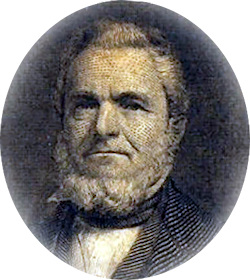Bank of the Republic,
New York, Feby. 22d, 1861.
My Dear Sir: If the S. Confederacy are going to make a tariff, how will they adjust the navigation of the Mississippi? It is greatly better to put a ten pr. ct. duty on exports; but best of all to go free trade in full. That will settle the Mississippi question at once and without exception from any one. But above all, free trade will commend you to the European powers and cause them to go with you and not with the North.
The police would not surrender the 10 cases muskets, and Gov. Brown has seized more vessels. I regret it because it increases irritation and agitation.
My opinion is that the Republicans will show their teeth after 4 March and blockade and collect the revenues after their fashion to which you will submit of course, after your fashion.
The interruption of vessels by Gov. Brown causes more damage to Georgia than to N. York. He ought to seize debts or some other property if he retaliate at all—which I think inexpedient at this time.
If you will have a tariff, make everything pay alike, with but few obvious exceptions—don’t begin to discriminate for any interest. It is a most unjust and iniquitous system at best, most expensive to collect, and dishonest in every respect. How can you settle with the N. West States with their horde of boatmen? They will overrun Louisiana in 2 weeks when they start. Make them your friends and not your enemies; and in opening the Missi. you will make friends of all Europe too.
Don’t be afraid to tax the people ; the people will pay taxes to get rid of Abolitionists, and if they will not, let them give up their negroes at once. But they are more intelligent than most people give them credit for. Deal frankly and honestly with them, and they will pay taxes and lend money too.
From Annual Report of the American Historical Association for the Year 1911.
Gazaway Bugg Lamar (1798-1874) was an American merchant in cotton and shipping in Savannah, Georgia, and a steamboat pioneer. He was the first to use a prefabricated iron steamboat on local rivers, which was a commercial success. In 1846 he moved to New York City for business, where in 1850 he founded the Bank of the Republic on Wall Street and served as its president. He served both Southern businesses and state governments. After the start of the American Civil War, Lamar returned to Savannah, where he became active in banking and supporting the war effort in several ways. With associates, he founded the Importing and Exporting Company of Georgia, which operated blockade runners.
Lamar and Cobb were cousins by marriage.
Howell Cobb was an American political figure. A southern Democrat, Cobb was a five-term member of the United States House of Representatives and Speaker of the House from 1849 to 1851. He also served as the 40th Governor of Georgia and as a Secretary of the Treasury under President James Buchanan. Cobb is, however, probably best known as one of the founders of the Confederacy, having served as the President of the Provisional Congress of the Confederate States.
